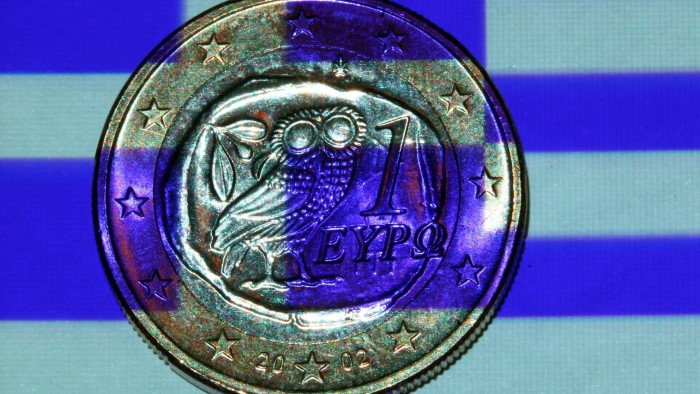Greek debt crisis: Key dates on the road to a possible Grexit

Simply sign up to the EU economy myFT Digest -- delivered directly to your inbox.
The five-month stand-off between Athens and its bailout lenders has entered its most critical phase.
The Greek government on Monday submitted an 11-page economic reform plan that eurozone leaders finally deemed good enough to restart negotiations to release €7.2bn in rescue funds that Athens desperately needs to meet its debts and keep the government running.
But time is running short to finalise a deal and get all the legislative approvals completed before the bailout runs out next Tuesday. Without the aid, Athens could default as soon as next week, when a €1.5bn repayment to the International Monetary Fund falls due.
These are some of the important dates in the weeks ahead:
Monday June 22: Emergency summit

Although the reform proposal from Greece arrived too late Monday morning for either eurozone finance ministers or their prime ministerial bosses to properly evaluate them at back-to-back meetings in Brussels, most involved said the plan was a good starting point. They tasked negotiators from Greece’s trio of bailout monitors to spend the following 48 hours hammering out a deal.
During the heads of state summit, Alexis Tsipras, the Greek prime minister, again made a plea for debt relief to be included in any new agreement. But his fellow leaders made clear that while they are open to discussing some kind of restructuring of Greece’s bailout loans, that will only come after the current negotiations over a reform programme are complete.
Wednesday June 24: Eurogroup meeting

Two Greek ministers have agreed to stay in Brussels to negotiate with representatives of the country’s bailout monitors through Wednesday night, when eurozone finance ministers will return for a eurogroup meeting to review any agreement.
Although there was optimism in the air Monday night, officials who attended Monday’s eurogroup meeting said there was still a lot of scepticism towards the Greek position.
In addition, although one of Greece’s bailout monitors — the European Commission — has expressed enthusiasm for the new Greek plan, the commission has long been the institution pushing hardest for compromise. The International Monetary Fund maintained a tough line and it is not clear it will support a plan that relies so heavily on tax increases and spurns spending cuts.
June 25: Another Greek summit?

This is the date for the beginning of a long-scheduled EU summit. However, the meeting already has a full agenda, including UK prime minister David Cameron’s promised unveiling of plans for renegotiating Britain’s relationship with the EU and negotiations over how to deal with the influx of refugees from north Africa.
But because Mr Tsipras has insisted debt relief be included in any deal — so he can sell it back home — eurozone leaders may use this gathering to issue a statement endorsing the idea of restructuring Greece’s bailout loans once a deal on an economic reform plan is in place. The eurozone has promised this before, back in November 2012, and it remains unclear whether the mere promise of future debt relief will be enough for Mr Tsipras.
June 29: Recalling the Bundestag

The primary reason a deal must be concluded by June 25 is so there is enough time for eurozone parliaments to approve an extension of the existing bailout programme.
Jeroen Dijsselbloem, the Dutch finance minister who heads the negotiations for his 17 eurozone counterparts, has said there is simply no longer time for Greece to legislate and pass all the “prior actions” needed to win bailout money before the rescue programme runs out at the end of the month. So it will have to be extended for a third time in seven months.
Under national laws, any extension must be approved by a handful of eurozone parliaments — most importantly the German Bundestag, which is due to be on recess next week. Although the centre-right bloc of Chancellor Angela Merkel has become increasingly restless over Greece, they are likely to back any extension she endorses — even if they have to return from holiday to do so. But the vote must be held either the 29th or 30th, giving legislators precious little time to review the agreement.
June 30: Expiration date

The date Greece’s bailout expires and when it is due to repay €1.5bn in loan repayments to the International Monetary Fund. Even if a deal is in place before the deadline expires, it remains unclear how — or whether — Greece will find the money to pay the IMF, since there is not enough time for Athens to pass all the economic reforms necessary to gain access to any of the €7.2bn in bailout funds.
One option to quickly raise funds would be for the ECB to lift its existing cap on the amount of short-term debt the Greek government can issue by about €2bn. This would enable Athens to quickly raise cash to make the IMF payment.
The ECB imposed the cap in February because of signs Greek banks were the only buyers of such Treasury bills. Because Greek banks are only staying open through ECB-approved emergency loans, increasing the t-bill cap would essentially mean central bank money was being used to fund the Greek state — a violation of EU law.
But the ECB could decide that an agreement on a new economic reform plan means that new money, in the form of bailout aid, is on its way to Athens, meaning T-bill sales to Greek banks are not directly funding government operations. That would allow them to raise the cap.
It is also possible Athens just misses the payment. Although technically this is not a default, since IMF rules consider a non-payment “arrears”, Greece would join a motley crew of developing countries — Somalia, Cuba and Zimbabwe — that have current or former “overdue obligations” to the IMF.
But credit rating agencies have said that non-payment to the IMF is not formally a default, and the ECB is unlikely to decide it means Greece is bankrupt. If it did, much of the collateral used by Greek banks to obtain their emergency loans — particularly Greek government bonds — would be worthless. That would mean the ECB having to cut off emergency funding, probably forcing a Grexit.
July 1: The extended bailout

If a deal is reached and all the legislative approvals are voted in time, Greece’s bailout would be extended for anywhere from three to nine months. For the EU’s portion of the bailout, the extension is expected to include a bit more money as well.
Of the €7.2bn in the current bailout tranche, the eurozone is due to contribute about half (the other half would come from the IMF). On top of that, €10.9bn in rescue funds that had been set aside to recapitalise Greece’s banks remains unused and eurozone leaders are likely to approve a “repurposing” of those funds as general bailout aid.
In addition, another €1.5bn in profits on Greek bonds held by the ECB — which are to be refunded to Athens as part of a deal reached three years ago — come online July 1. All told, that’s about €16bn in EU aid available to Athens as part of the extension. The length of the extension will depend largely on how long officials determine that money can last.
There is also about €16.4bn remaining in the IMF’s portion of the bailout, which runs through March 2016.
July 20: Drop-dead deadline

This may be the real drop-dead deadline: the date two bonds totalling €3.5bn fall due to the ECB.
Although credit rating agency Standard & Poor’s said recently it would not consider a failure to pay these bonds a full default — it said only non-payment on bonds held by private creditors constitutes a default in their books — it would be virtually impossible for Greece to survive inside the eurozone if it defaulted on the ECB.
That means Greece must legislate for and implement the entire reform programme before this date so that it ensures it has bailout funding in time to repay the ECB. Another €3.2bn is due for two more bonds held by the ECB on August 20.
Comments